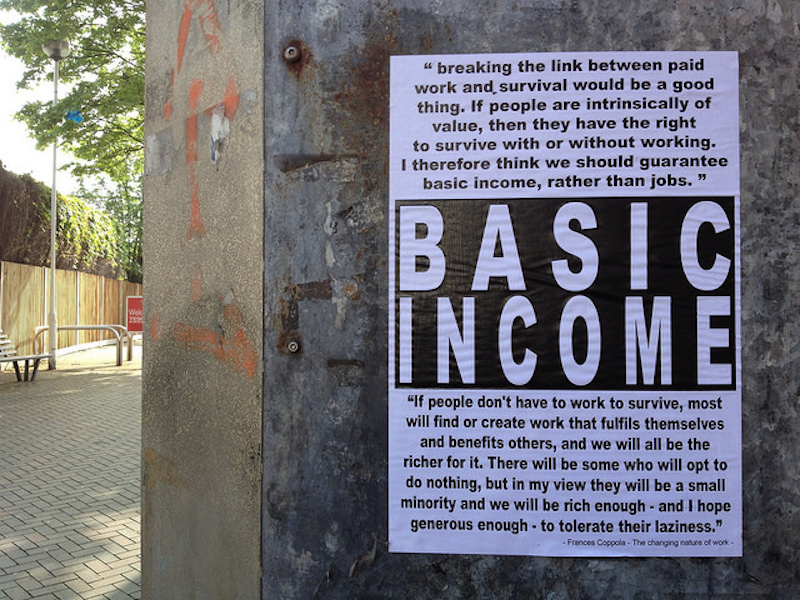In part one of a two-part series, Ida Männistö explains Finland’s Basic Income Program. Stay tuned for part two, where she explores how automatization has contributed to Finland’s high unemployment, and why a basic income program may be a good mechanism to mitigate this consequence.
The Government of Finland laid out a proposition in October 2016 to carry out an unprecedented social experiment: the implementation of a basic income program. The legislative proposal was welcomed by the majority of the parties represented in the Finnish parliament and implemented by the Government on January 1, 2017. The Ministry of Social Affairs and Health will assess the success of the program, which ideally lays the foundation for a more comprehensive basic income study in the future.
The purpose of the experiment is to demonstrate how feasible and beneficial a basic income program is as a tool to improve social security. A primary hypothesis, that the Finnish Government hopes to verify through the study, is the stipulation that a basic income can potentially create greater incentives among its recipients to pursue work opportunities, which will reduce unemployment and increase tax-revenue. The leader of Finland’s Green Party, Ville Niinisto, claimed that basic income allows people to pursue work opportunities they might otherwise disregard.
With a heavily constrained economy and an unemployment rate of nearly eight percent, Finland’s economic outlook is one of the less prosperous in Europe. Years of weak growth and a particularly crippled forest industry suggesting Finland may be the next Euro-country to face a severe financial crisis. Even the previous Minister of Finance labeled Finland as “the sick man of Europe’’ in the beginning of 2016.
The stagnant economic situation in the Nordic country has resulted in political convulsions and evoked a sense of uncertainty among its people. Yet, desperate times call for innovative action plans. The basic income experiment could provide new gateways for coping with a domestic economy in distress. A vocal debate is taking place worldwide on whether basic income can alleviate poverty and unemployment related issues. According to those in favour of a universal basic income, such a policy initiative fosters a sense of safety and reduces stress, especially among unemployed people. A basic income allegedly improves the living standards in vulnerable communities and helps to dismantle socioeconomic inequalities.
The Finnish experiment allocates 650 euros a month (C$782) to a test group. The test group consists of two thousand randomly selected citizens who were, at the time of the project’s implementation, receiving unemployment-related benefits. Participation is mandatory and the recipients are entitled to use the money in anyway they wish.
It is fairly reasonable to include only unemployed people in the test group, since a key goal of the experiment is to examine the utility of basic income as a way to boost employment. However, it fails to represent other vulnerable communities that might be relevant to investigate. For example, minimum-wage earners or part-time workers are arguably groups who could find themselves incentivized to look for better paying long-term jobs if provided with a basic income. Government representative Olli Kangas has mentioned that if the experiment proves successful, it is likely to be expanded to incorporate other societal groups with a low income.
Finland is known for its comprehensive social security system which appears to have paved the way for a troublesome phenomenon: unemployed people are prone to remain unemployed and receive generous government benefits instead of finding a temporary, low-salary job. Social benefits can often exceed salaries from low-income jobs, due to the generous welfare structure in the country. The government hopes that a monthly basic income stimulates its recipients in their search for a job, as an additional salary will not be deducted from the basic income.
The Ontario government is currently deliberating the possibility of initiating a basic income pilot study this year. Former senator Hugh Segal proposed that the study would focus on two voluntary test groups in two different communities, without disrupting any poverty-reduction efforts that already exist. In contrast, the Finnish experiment is done on a non-voluntary basis and does not distinguish between national communities. Moreover, the 560 euros in Finland are subtracted from social benefits that the test group previously received and serves as a replacement for them.
Democratic countries with high levels of unemployment are surely following the process and outcomes of Finland’s basic income experiment. The notion of introducing a basic income is gaining recognition, particularly in the EU, where according to a survey study, almost 70% of the population would consider voting in favor of such a policy initiative.
It will be interesting to observe the socioeconomic implications of Finland’s experiment, especially as a fourth industrial revolution arises: the automatization of jobs. One of the major consequences of automatization is unemployment. It is important to find what mechanisms can mitigate this harmful outcome. Evidently, one of the major consequences of automatization is unemployment. A basic income program, with the potential to boost employment, may be a good mechanism.
Photo: Unconditional Basic Income (2014), by Russell Shaw Higgs via Flickr. Licensed under CC BY-NC-SA 2.0.
Disclaimer: Any views or opinions expressed in articles are solely those of the authors and do not necessarily represent the views of the NATO Association of Canada.




